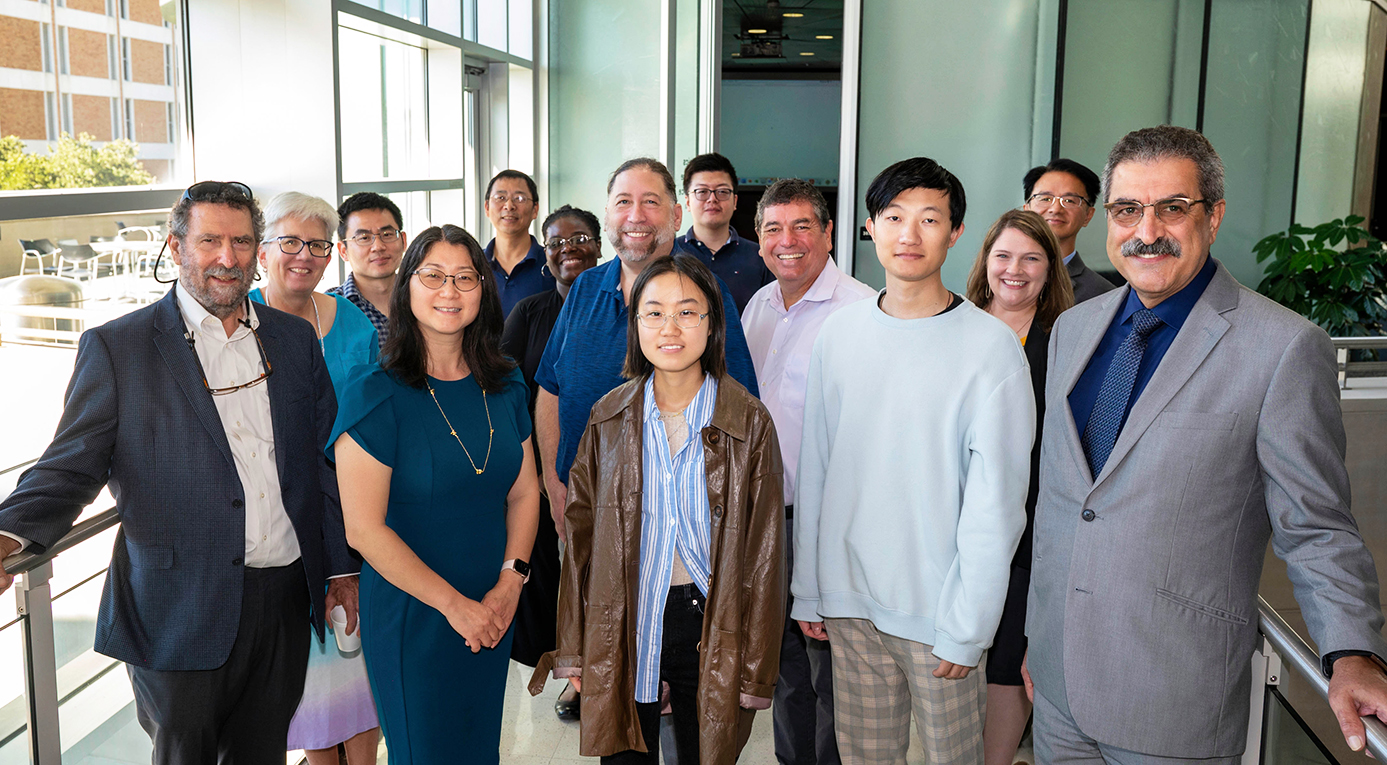UTA hosts kickoff meeting of NASA satellite mission team

Space physicists from around the United States met this month at The University of Texas at Arlington to discuss strategies for a new mission designed to study the complex and dynamic boundary between Earth’s atmosphere and space.
The Geospace Dynamics Constellation (GDC) mission is a major NASA project which will utilize a constellation of satellites to study Earth’s upper atmosphere and provide the first direct global measurements of Earth’s atmosphere/space boundary, which is called the ionosphere-thermosphere (I-T) system.
One project which is supporting the GDC mission, titled “Study of multi-scale forcing impact on the I-T system: Support from physical models and observations (SOPHIE)”, is being led by Yue Deng, UTA distinguished professor of physics. Deng was selected as one of three Interdisciplinary Scientists (IDS) for the mission and heads a group of colleagues from UTA and the SOPHIE team.
NASA is providing UTA with $3.1 million in funding over seven years during the mission preparation phase of the project, which is expected to launch in 2029.
The group conducted a kickoff meeting at UTA on October 4-5 to discuss strategies and deliver progress reports. In attendance was Douglas Rowland, NASA project scientist for the GDC mission, as well as members of the SOPHIE team, either in person or virtually:
Deng; Mingwu Jin, UTA professor of physics; Ramon Lopez, UTA professor of physics; Cheng Sheng, UTA assistant professor of research in physics; Christine Gabrielse, research scientist at Aerospace Corp.; Dan Welling, assistant professor at the University of Michigan; Sebastijan Mrak, research associate at the University of Colorado at Boulder; Shunrong Zhang, research scientist at MIT Haystack Observatory; and Simon Wing, research scientist at Johns Hopkins University Applied Physics Laboratory (APL).
The conference began with opening remarks of support and endorsement by Kate Miller, UTA vice president for research; Morteza Khaledi, dean of the UTA College of Science; and Alexander Weiss, professor and chair of the UTA Department of Physics.
On October 4, Rowland also delivered a talk on the mission during a special presentation in the UTA Planetarium as part of the College of Science’s celebration of World Space Week.
“GDC is a mission to help us understand the drivers of space weather in low-Earth orbit,” Rowland said. “It will dramatically improve our ability to predict space weather.”
The GDC mission will utilize six satellite observatories orbiting at 400 kilometers (248 miles) above the Earth to provide the first global view of low-Earth orbit space weather, Rowland said. This region of the atmosphere is where Earth’s I-T system strongly responds to energy inputs from the Sun and space environment above, and from the lower atmosphere below, and redistributes this energy.
Three of the six satellite instruments have been selected: the Comprehensive Auroral Precipitation Experiment (CAPE), which will measure high-energy charged particles entering the upper atmosphere from Earth’s space environment; Atmospheric Electrodynamics probe for Thermal plasma (AETHER), which will describe the complex nature and structure of the ionosphere focusing on understanding phenomena that contribute to space weather; and Modular Spectrometer for Atmosphere and Ionosphere Characterization (MoSAIC), which will measure thermospheric winds and the composition of the thermosphere-ionosphere by observing the charged and non-charged particles within near-Earth space.
The major outcome of the SOPHIE GDC-IDS kickoff meeting is developing the matrix for the future collaboration and the short-term and long-term plans for the team to support the GDC mission, which includes a further improvement of the Global Ionosphere-Thermosphere model (GITM) and application of deep learning technique for space weather, Deng noted.
“It was a very productive meeting, which strongly enhanced the communication inside the team and kicked off our project in a very collaborative manner,” Deng said. “The comments from Dr. Rowland helped to guide us to start our works in a way aligned with GDC mission objectives very well.”
--
The UTA College of Science, a Texas Tier One and Carnegie R1 research institution, is preparing the next generation of leaders in science through innovative education and hands-on research and offers programs in Biology, Chemistry & Biochemistry, Data Science, Earth & Environmental Sciences, Health Professions, Mathematics, Physics and Psychology. To support educational and research efforts visit the giving page, or if you're a prospective student interested in beginning your #MaverickScience journey visit our future students page.